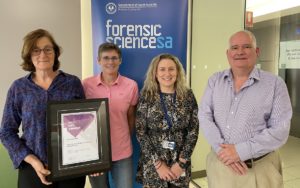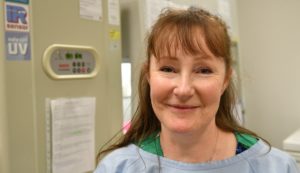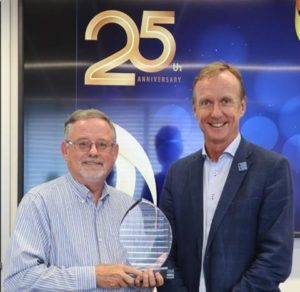
Flinders researchers have been awarded for the nation’s best forensic science case study, while childhood dementia researchers take to the mountain top for fundraising, and a 25-year milestone is acknowledged for POCT stalwart Professor Mark Shephard.
“Third-hand” amphetamine exposure paper wins award

Dr Jackie Wright, Michaela Kenneally, Associate Professor Kirstin Ross and Associate Professor Stewart Walker were awarded the 2020 Australian and New Zealand Policing Advisory Agency National Institute of Forensic Science (ANZPAA NIFS) Best Case Study for their paper “Environmental methamphetamine exposures and health effects in 25 case studies”. This publication is the culmination of many years of work that establishes health effects of unwitting environmental exposure to “third hand” methamphetamine after it has been cooked or smoked and the users or cooks have left the property and subsequent owners or renters move in and are affected by the methamphetamine left behind.
The article was published in Toxics and has received more than 2600 reads in eight months and is available for free download.
This paper is a continuation of the research Dr Wright undertook for her PhD from Flinders University and runs her company from Sydney. Ms Kenneally has worked at Forensic Science South Australia for 15 years after graduating from the Forensic and Analytical Chemistry degree.
NIFS makes six awards each year in different categories – and Flinders staff, adjunct staff and alumni won four of the categories (Best Paper – Forensic Fundamentals, Best Paper – Capability Enhancement and Innovation, Best New Publisher in a Refereed Journal, Best Case Study) and were Highly Commended in the fifth (Best Technical Article or Note), which indicates that forensic research from Flinders is the best in Australia.
Providing fresh Japanese insights
Dr Tets Kimura has been awarded a competitive Japanese Studies Fellowship, offered by the Japan Foundation (Tokyo), for his research on Japanese fashion during the Second World War. This is part of his ongoing research on a comprehensive history of Japanese fashion. Dr Kimura is scheduled to visit Japan later in the year or early next year, interviewing Japanese WWII survivors and visiting peace museums in various locations of Japan.
Dr Kimura has also had his translation published of The Dark Master, a professional theatre production that was performed at the 2019 OzAsia Festival in Adelaide. His translation of the play – which was directed by Tanino Kuro and presented by Niwa Gekidan Penino from Tokyo – and an additional Translator’s Introduction have been published in the Electronic Journal of Contemporary Japanese Studies.
Scaling the peaks to raise funds for Childhood Dementia

In early May, Associate Professor Kim Hemsley is participating in the 3 Peaks Challenge, a hiking trek that serves as a fundraiser for the Australian Childhood Dementia Initiative – which hopes to raise $40,000 from the venture. Her personal fundraising goal is $2000 and she’d love help from everyone in the Flinders University community to hit the target. The trek will take 14 participants to the summit of Mount Kosciuszko, Australia’s highest mountain, along with its sister peak Mount Etheridge and the nearby Rams Head North. Donations can be made via this link; alternatively, you can support the Childhood Dementia Initiative by buying some Jolly socks. Please contact Associate Professor Hemsley for details.

Professor Mark Shephard was recently joined by past and current staff to celebrate his outstanding 25-year contribution to the field of Point-of-Care Testing , which included Professor Jonathan Craig acknowledging Professor Shephard’s outstanding contribution at the tenth anniversary of the Flinders University International Centre for Point-of-Care Testing.
Professor Shepherd has been recognised nationally and internationally as a pioneer and leader in the field of POCT, with his leadership in research providing a sound evidence base for the clinical, cost and cultural effectiveness of POCT in rural and remote communities nationally and globally.
In 1995, without guaranteed employment or funding, Mark Shephard made a ‘brave’ decision to leave his medical scientist career to explore whether point-of-care testing (POCT) could be translated from the laboratory to the field. Many thought it could not be done. But Mark had spent many months travelling Australian deserts and had observed high chronic disease burden and poor access to routine health services faced by those living in these remote communities. He suspected that POCT had an important application in alleviating healthcare inequity.
His innovative ideas and bold actions proved successful. Fast forward 25 years, to 110+ peer-reviewed publications, $40+ million of program funding, a textbook guiding global point-of-care testing, undergraduate and postgraduate teaching and 20+ staff in a globally designated WHO Collaborating Centre research centre. Mark has been recognised nationally and internationally as a pioneer and leader in the field of POCT, with his leadership in research providing a sound evidence base for the clinical, cost and cultural effectiveness of POCT in rural and remote communities nationally and globally. Current POCT networks managed by the International Centre for Point-of-Care Testing include those for acute, chronic and infectious disease, including emergency outbreak response programs for syphilis and COVID-19, with a strong focus on community-led Aboriginal and Torres Strait Islander health.
Recognition for Dr Space Junk goes into orbit
Associate Professor Alice Gorman – fondly known in the online universe as Dr Space Junk – has been selected as a finalist in the Australian Space Awards in four categories. Her nominations are for Academic of the Year: advocating for a fair and ethical space industry; Innovator of the Year: new approaches to the space environment; Female Leader of the Year: Space4Women, supporting Australian women in STEM and space; and Researcher of the Year: space archaeology and heritage. These awards received a record number of applicants this year, making Associate Professor Gorman’s suite of nominations all the more impressive. Details of all the award nominees can be found via this link. Winners of the awards will be announced at event in Sydney on June 4.

